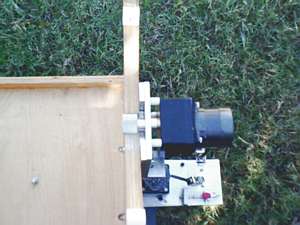
A picture of both axis'. The top one is the Alt axis.
You can get the idea of how the Alt Axis works from this picture. A small
cut is needed in the side of the rocker box.
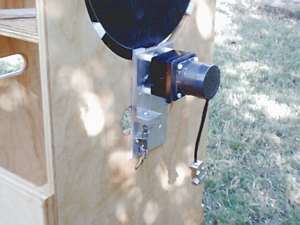
A picture up close of the Alt axis. You can see the
gearhead and the stepper mounted on the pair of plates. There is a small
lever at the bottom left of the top plate. That is a clutch lever. Lift
it up and lock it, the drive is engaged. Down, and manual motion is restored.
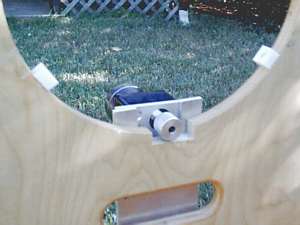
A picture of the drive knob and a crudely cut notch.
The notch is not typically seen and does not need to be "perfect" by any
means. The requirement is to have room for the knob to operate in both
engaged and dis-engaged modes.
The knob is "splined" and runs over the current Alt
bearing surface that is covered with an industrial strength Velcro.
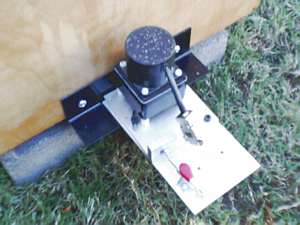
This is the Az. axis. The plate is the exact same
one as is used on the Alt. axis. It is held onto the mount with a piece
of steel angle. It is bolted to it. The angle is then bolted to the side
of the mount. It can be just screwed on initially, but I prefer bolting
it on. If I step on this one, it will tip over the scope rather than break
the bracket.
The plates are made of 1/4" 6061 aluminum.
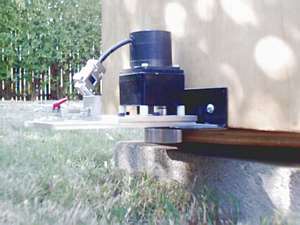
This is how it works. A 2" OD aluminum splined knob
presses with some force, which is adjustable, against the rim of the ground
board.
The circuitry and laptop for
each order will look like what is pictured here:
Features list:
Unlike other GoTo systems, this one is good for a lifetime
- it "evolves" with you and whatever you will use in the future. Motors,
computer, cables, software and (usually) the gearing, can be used on other
mounts (Dobs or GEMS) with a little modification to the new mounting.
It does NOT use encoders, none are
required or even recommended.
There is no Field de-rotator included
in any system but the system is quite capable of using one for astrophotography.
Stepper motors that are quiet enough to talk over in a
normal tone of voice when tracking and nearly silent when slewing.
Time tested software and hardware.
A small 17 amp hour gel cell battery is good for one night
of observing.
Resolution is at .135 arc seconds for this mount. Better
resolution is available on request.
Laptop is included with your order. Speeds/brands vary
from a 486 to a P166 typically.
Software is included and pre-configured. (you will need
to fine tune some of it)
Free phone and e-mail support.
Instructions for operating the software are included.
System is GoTo and point-accurate to within one arc minute.
Start up time is less than 2 minutes.
A one button grand tour mode is standard.
Unlimited database, custom made, DIY and large database
included free.
Easy 2 star alignment.
Custom made grand tour files are available for free and
can be sent to you via e-mail or floppy. Install time for these is 1 minute.
Multiple mount error correction routines are standard.
Gearing backlash control is standard.
Laptop can have Guide installed,
a planetarium program that graphically displays the night sky. Access from
inside the scope software with one key.
Laptops and the circuitry can usually be powered from
the same battery. There is no need typically, for a power outlet.
LX-200 interface for control with other computer programs,
standard.
40 microsteps per full step of the motors. Typical number
of microsteps with the gearing is 5,760,000.
Drift compensation standard (allows lunar/planet tracking
at high power for CCD work)
Realtime display of coordinates.
Built in observing log is standard.
What is included in
the order:
A used P90 or faster laptop configured
to run with the hardware and software. (You can supply this item and save
$165.00)
The circuitry made field ready.
A handpad and cable.
2- stepper cables, 20' long.
2- completely assembled brackets
with steppers, gearheads, splined knobs and clutch lever.
NEW steppers that are 400 steps
per revolution.
Power cable for the laptop and
the circuitry.
Tested gearhead/stepper/laptop/circuitry.
Software set up as much as possible.
End user must input certain parameters.
What is needed from you to complete
the order, aside from payment :
1. Your ground board must be
a circle. The edge of the GB must come within 1/2" of the edge of the rocker
box. If it does not (some don't), a new ground board must be made. Please
contact me if you need that.
2. The exact O.D. of the Alt.
trunion you intend to drive.
3. The O.D. of the ground board.
The material it is made of will be helpful too.
4. Mirror size, truss or tube,
and brand of scope, if not home made.
5. The thickness of the ground
board.
Some scopes will require a precision
bearing to be used on one or two of the Alt. contact points. These items
are available at an added cost. Typically, large truss scopes will need
these.
|
